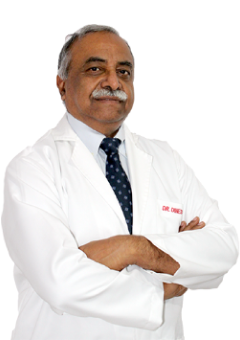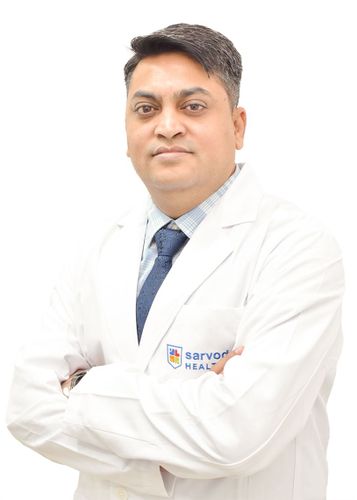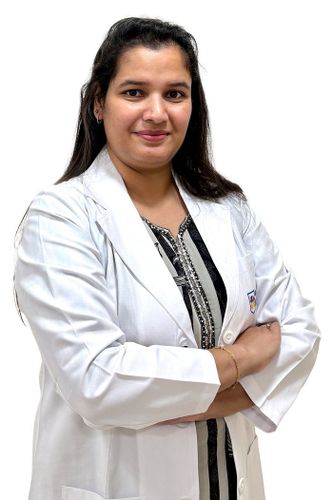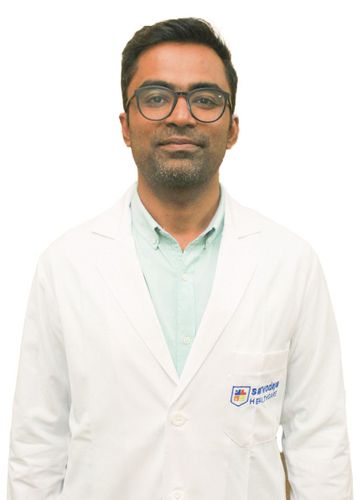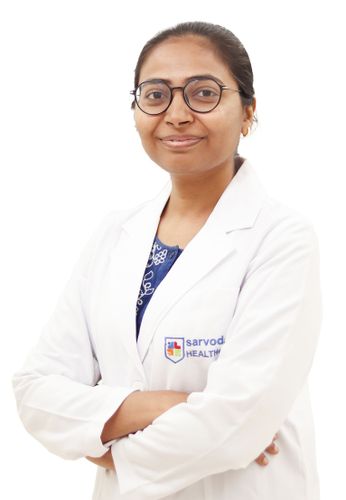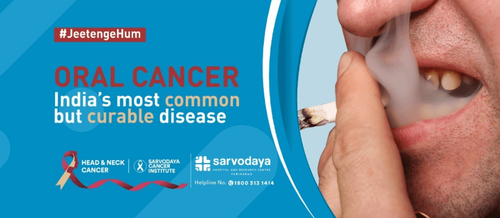Overview
At Sarvodaya Hospital, we are dedicated to delivering comprehensive care and support to individuals affected by oral cancer. Oral cancer is a serious condition that can affect any part of your mouth, including the lips, tongue, cheeks, and throat. Early detection and specialised treatment greatly improve outcomes.
Having some of the best oral cancer doctors in Faridabad and Delhi NCR, we combine advanced technology, expert doctors, and a compassionate approach to guide you through every step of your journey, ensuring personalised and effective care for you and your loved ones.
Symptoms of Oral Cancer
- A sore or ulcer in the mouth, lip, or throat that does not heal
- Lump, swelling, or thickened area in the mouth, throat, or on the lips
- Persistent pain, tenderness, or numbness in any part of the mouth or lips
- Bleeding inside the mouth without a clear cause
- Difficulty or pain while chewing, swallowing, or speaking
- Difficulty or pain in moving the tongue or jaw
- Unexplained loosening of teeth or dentures that no longer fit well
- Sore throat or feeling that something is caught in the throat
- Change or hoarseness in the voice
- Lump or swelling in the neck
- Unexplained, sudden weight loss
- Persistent bad breath
Causes of Oral Cancer
- Tobacco use (all forms: cigarettes, cigars, pipes, chewing tobacco, snuff, etc.)
- Excessive alcohol consumption
- Combined use of tobacco and alcohol significantly increases the risk
- Human papillomavirus (HPV) infection, especially HPV type 16
- Prolonged sun exposure (particularly relevant for cancer of the lips)
- Poor diet, especially low intake of fruits and vegetables
- Age (risk increases with age, especially after 40-55)
- Weakened immune system
- Poor oral hygiene and chronic mouth irritation
- Genetic predisposition or family history of oral cancer
- Chewing betel nut, gutkha, or paan
- Certain viruses
Diagnosis of Oral Cancer
Diagnosing oral cancer involves a combination of tests and evaluations to ensure accurate and early detection. Our experienced team focuses on timely diagnosis so you can begin the right oral cancer treatment as soon as possible.
- Medical history and clinical examination: We assess your symptoms, lifestyle risk factors, and conduct a thorough visual and tactile examination of your mouth, neck, and related areas to spot any suspicious changes.
- Biopsy (tissue sampling): Considered the gold standard, a sample of tissue or cells from the suspicious area is taken and analysed under a microscope to confirm oral cancer.
- Imaging tests: Tests like X-ray, CT, MRI, PET scans, and ultrasound help determine the exact size of the tumour and whether cancer has spread to nearby tissues or lymph nodes.
- Adjunctive diagnostic aids: Devices such as autofluorescence, tissue reflectance, and brush cytology support early detection and screening, especially useful for high-risk patients or when lesions are difficult to evaluate.
- Endoscopic examination: This method allows us to visually inspect deeper parts of the mouth or throat and assess cancer spread beyond what can be seen directly.
- Laboratory tests and liquid biopsy (in select cases): Blood tests, including those for tumour markers, and laboratory checks for general health, are used before starting treatment or in cases where a more targeted approach is needed.
Treatment for Oral Cancer
- Surgery: Surgery remains the primary treatment for many oral cancers. It aims to remove the tumour and, if necessary, affected lymph nodes. Reconstructive procedures, using grafts or dental implants, can restore your appearance and oral function following tumour removal.
- Radiation Therapy: High-energy radiation targets and destroys cancer cells. We offer both external beam therapy and brachytherapy (internal radiation). Radiation may be used alone, after surgery, or as the main treatment where surgery isn’t suitable.
- Chemotherapy: Powerful anti-cancer medicines are given orally or intravenously to destroy cancer cells, often combined with radiation (chemoradiation) for advanced disease or following surgery.
- Targeted Therapy: These drugs attack specific cancer cell mechanisms, such as EGFR inhibitors, offering greater precision and typically fewer side effects than standard chemotherapy.
- Immunotherapy: Designed to stimulate your immune system, these treatments, including immune checkpoint inhibitors, are increasingly used for advanced or persistent oral cancer.
- Palliative Treatment: When a cure is not possible, palliative care focuses on relieving symptoms and promoting comfort and quality of life.
Prevention & Lifestyle Modification for Oral Cancer
Taking preventive steps can significantly lower your risk of developing oral cancer. Small lifestyle changes and regular health monitoring go a long way in ensuring long-term oral health. At Sarvodaya, the best oral cancer hospital in India, we promote awareness and empower individuals to take charge of their well-being.
- Refrain from smoking cigarettes, cigars, pipes, and using products like chewing tobacco, gutkha, or paan.
- Excessive alcohol use is a major risk factor; drink responsibly or abstain.
- Brush and floss regularly, and visit a dentist for routine check-ups to detect early signs of trouble.
- Include plenty of fresh fruits and vegetables, as antioxidants and vitamins help protect cells from damage.
- Use lip balms with SPF and avoid direct sun whenever possible.
- The Human Papillomavirus (HPV) vaccine can lower risk, especially in younger populations.
- Address ill-fitting dentures, sharp teeth, and other conditions that cause repeated trauma in the mouth.
- Check your mouth, gums, tongue, and lips for unusual sores, lumps, or colour changes and report them to a healthcare provider.
- Overall fitness helps boost immunity and resilience against many diseases, including cancer.
- Learn about risk factors, attend awareness programs, and encourage family and friends to do the same.
Pre and Post Oral Cancer Treatment Lifestyle Modifications
Pre-treatment:- Get a full dental check-up to fix infections, cavities, or denture issues.
- Use a soft brush, fluoride toothpaste, and alcohol-free mouthwash daily.
- Consult a dietitian to build a strong, nourishing diet.
- Stop smoking and limit or quit alcohol entirely.
- Use saliva stimulants and soothing foods to reduce side effects.
- Do light doctor-approved exercises to build treatment tolerance.
- Brush gently and rinse with dentist-recommended products.
- Eat soft, moist, non-irritating foods and stay well hydrated.
- Join speech or swallowing therapy if needed.
- Use lozenges, artificial saliva, and avoid drying substances.
- Check your mouth daily for sores or unusual changes.
- Stay active, get good sleep, and seek emotional support.
- Attend follow-ups regularly for continued care.


